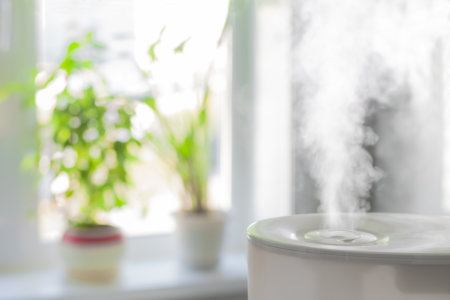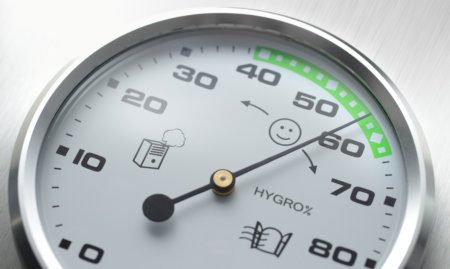Dry skin, stuffy noses, scratchy throats, chapped lips, and nose bleeds can all be a result of the cold winter air. It’s no secret that winter air contains less moisture, and since it can dry out your skin and mucous membranes, it can lead to these uncomfortable symptoms.
 That’s not an ideal way to experience four months of the year. But the worst part is, forced air heat in the home only continues to dry out the air.
That’s not an ideal way to experience four months of the year. But the worst part is, forced air heat in the home only continues to dry out the air.
The ideal humidity in a home is between 40% and 60%, and anything lower than this can lead to discomfort and health problems.
You probably already know a humidifier can help raise moisture levels in the home, thereby revitalizing your skin, sinuses, and throat. While this is good news, with so many different humidifiers on the market, it can be difficult to find the best one for your home. Not all humidifiers are created to do the same job, and they certainly aren’t created equal.
Things to Consider When Comparing Humidifiers
Square Footage
Most humidifier specs clearly list the maximum square footage in which they will affect moisture levels. The most common household humidifiers are designed to work best in single rooms, but you can purchase humidifiers that will cover larger areas of the home.
Cool Mist vs Warm Mist
There’s no difference between cool mist and warm mist humidifiers when it comes to efficacy. Both work well to increase humidity in the home. However, there are a few differences that will affect your personal preference.
- Cool mist humidifiers will slightly lower ambient temperature.
- Warm mist humidifiers will slightly raise ambient temperature.
- Warm mist humidifiers may create a safety hazard because the heating element boils water. Unless the manufacturer deems them child-proof, this may preclude some models from being a viable option around small children.
Hard Water vs Soft Water
Does your home use hard or soft water? With hard water, you run into an increased mineral build up in the humidifier. Some humidifiers will pick up this dust and propel it into the air along with water particles. This “white dust” can coat furniture and even be inhaled.
It’s easy to avoid this problem. Many humidifiers have optional mineral packets that prevent white dust from escaping into the air, but the easiest way to avoid build up in a humidifier is to use distilled water and regularly clean the humidifier.
Noise
It’s more than likely you’ll want your humidifier to be running while you sleep, but some models are noisier than others. No one wants to rid themselves of the symptoms or dry air by trading for the symptoms of sleep deprivation.
Energy efficiency
While most humidifiers aren’t going to put a huge dent in your electric bill, they won’t all put the same dent in your electric bill. While you can get a humidifier that increases moisture over a greater square footage, it’s important to remember these units use significantly more energy.
 Types of Humidifiers
Types of Humidifiers
While several types of humidifiers exist, the two most popular types are evaporative and ultrasonic. From these two types of humidifiers, most buyers will find a machine that suits their needs.
Evaporative Humidifiers
An evaporative humidifier works exactly as its name implies: by evaporation. You fill a reservoir with water, that water soaks through a filter, and the machine’s fan blows through that filter, filling a room with moist air.
Upsides
- This type of humidifier is usually cheaper.
- Evaporators don’t create white dust.
Downsides
- These humidifiers can be noisy.
- Evaporators require filter changes to stay sanitary.
Ultrasonic Humidifiers
An ultrasonic humidifier uses high-frequency vibrations to create a fine mist. This is the most popular type of humidifier on the market.
Upsides
- An ultrasonic humidifier is extremely quiet.
- These units are ultra-energy-efficient.
Downsides
- Unfortunately, these units still have the potential to produce white dust, although mineral packets or soft/distilled water fix this problem.
Which Humidifier is right for me?
Most humidifier models will get the job done, so it really comes down to your personal preference. Evaporators are excellent if you want an easy way to prevent white dust, don’t mind a little noise, and will regularly maintenance them.
If you value peace and quiet, energy efficiency, have soft water or don’t mind the extra work of getting distilled water, you probably want an ultrasonic cool mist humidifier.
The best humidifiers to combat dry winter air are the ones switched on. Most will work to make you more comfortable. Your optimum choice comes down to personal preference, desired level of maintenance and home space.



![4 Ways Indoor Humidity Can Cause Problems For Your Business [2025 UPDATED]](https://blog.purennatural.com/hubfs/a%20factory%20with%20extreme%20humidity%2c%20showing%20condensation%2c%20heavy%20air%2c%20and%20workers%20struggling%20with%20the%20damp%20environment.webp)

